Subtitle
ZOHOLIC
Subtitle
ZOHOLIC
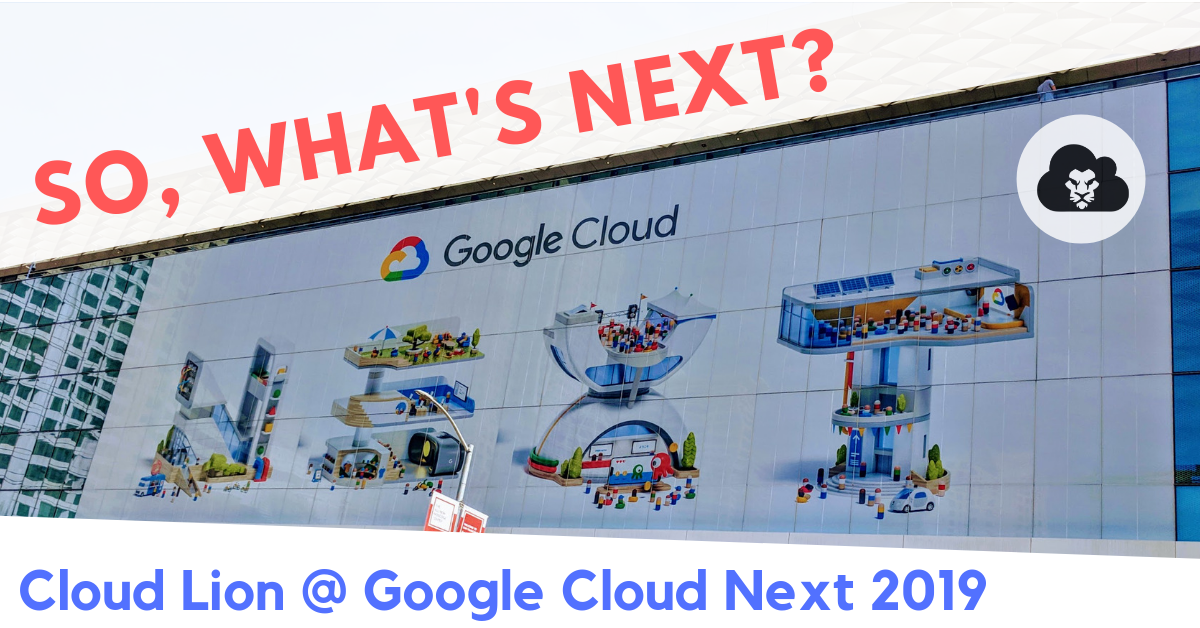
What a week! My head is still spinning from the sensory overload that these increasingly-massive Google conferences have become. So much to share - I will try be concise.
This is the fourth year Google organizes its San Francisco "Google Cloud Next" conference, and the third time I attend. Being a Google Partner, I have noticed a massive shift in what I speculate are Google's priorities. But let's rewind and put it all in context. Google is a company that is sexy as hell. Many people get "googly eyed" when you just mention the company's name (or that you are a partner to them). But this 90,000 employee Goliath is often enshrouded in mystery, and can be difficult to navigate and understand. I will share my insight so that other simple mortals may better understand what's happening.
Previously Google's Cloud offering was split between Google's SaaS (software as a service) offering G Suite (known as Google Apps before September 2016), and Google's IaaS (infrastructure as a service) / PaaS (platform as a service) offering GCP or Google Cloud Platform. Now everything falls under the same massive umbrella: Google Cloud.
If the difference between SaaS, PaaS and IaaS is unclear, this pizza analogy may be useful:
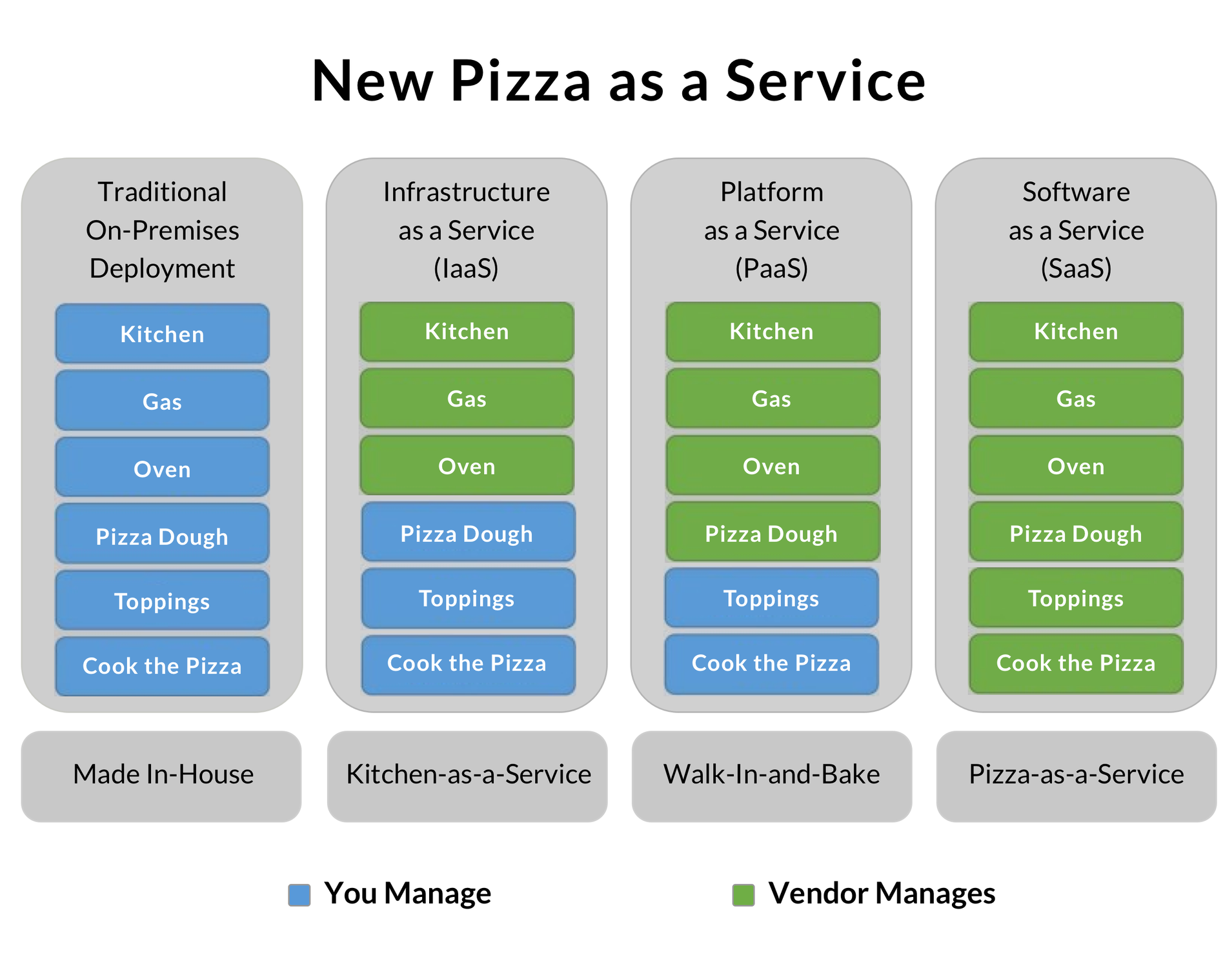
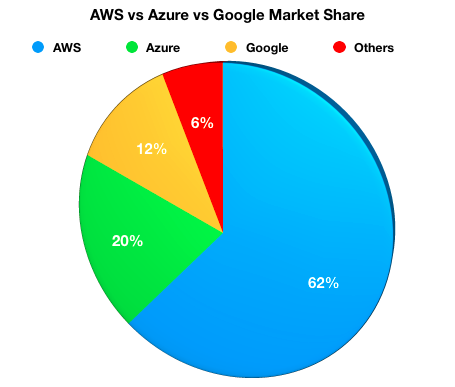
While Google Cloud is by far more technologically advanced than its competitors, it was too late in the game to enjoy a comparable market share (AWS got a 5 year head start), now Google is dedicating all its resources to catching up, and eventually surpassing Amazon's AWS and Microsoft's Azure.
Someone famously said:
"Google lives in the future and sends the rest of us signals".
About 3 years ago, I noticed every Google employee I knew had been transferred to work for GCP- a massive mobilization of personnel like this is a signal.
Then came the "enablement efforts". I do not have any concrete data on how many of these were organized, but there were tons of them across the world. Google Cloud Summit, Google Cloud OnBoard, Google Cloud ________ (fill in the blank), were all about getting the public to learn about, understand, and adopt GCP to then build with it.
In layman's terms, GCP is the massively-scalable technology that Google uses internally to run it's infrastructure and accelerate its innovation on a planetary scale.
The science-fiction-esque power that makes Google Google is available - for you, for me, or for any random citizen to build the most insane technology beyond our wildest dreams - be it the next Uber, Pokemon Go, or some internet-of-things, machine-learning-powered AI-driven Big Data Analytics frankenstein that functions contextually depending on our geo-location - anything is possible.
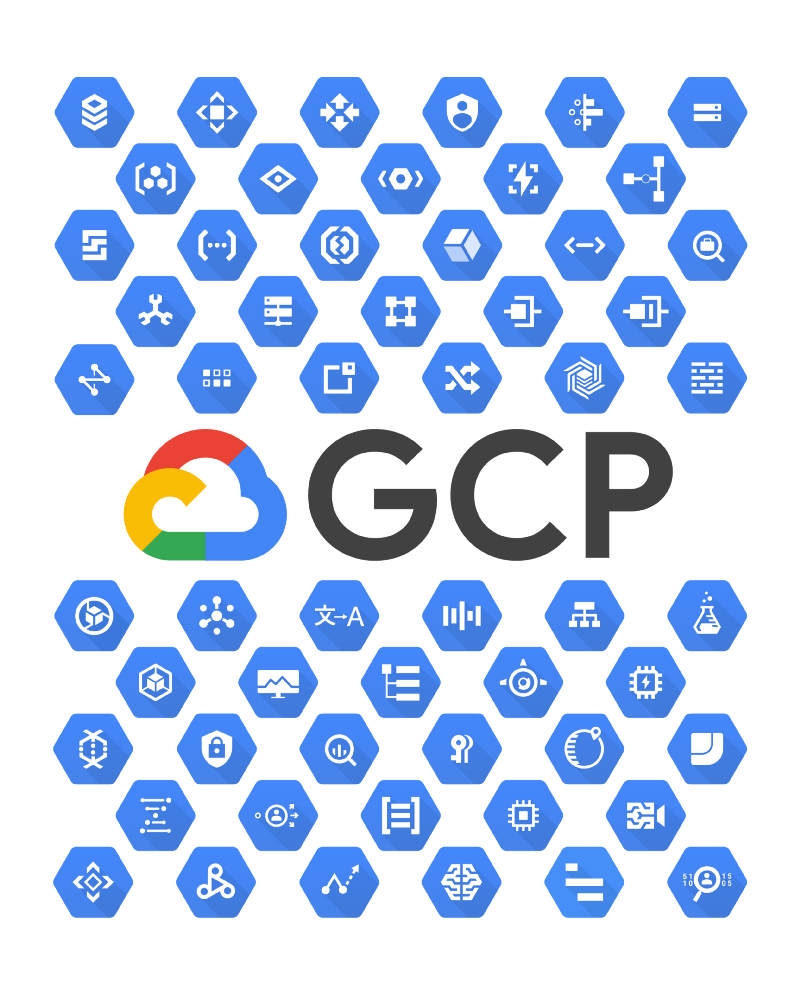
However, there is a barrier to entry. There is a vast amount of blue hexagons to learn (except for Kubernetes, which is technically a heptagon :-P). These can be categorized into: AI (artificial intelligence) and Machine Learning (ML), API Management, Compute, Data Analytics (Big Data), Databases, Developer Tools, Hybrid and multi-cloud, IoT (internet of things), Cloud Management Tools, Migration, Networking, Security and Storage. This ecosystem is constantly evolving and the picture to the left is far from complete.
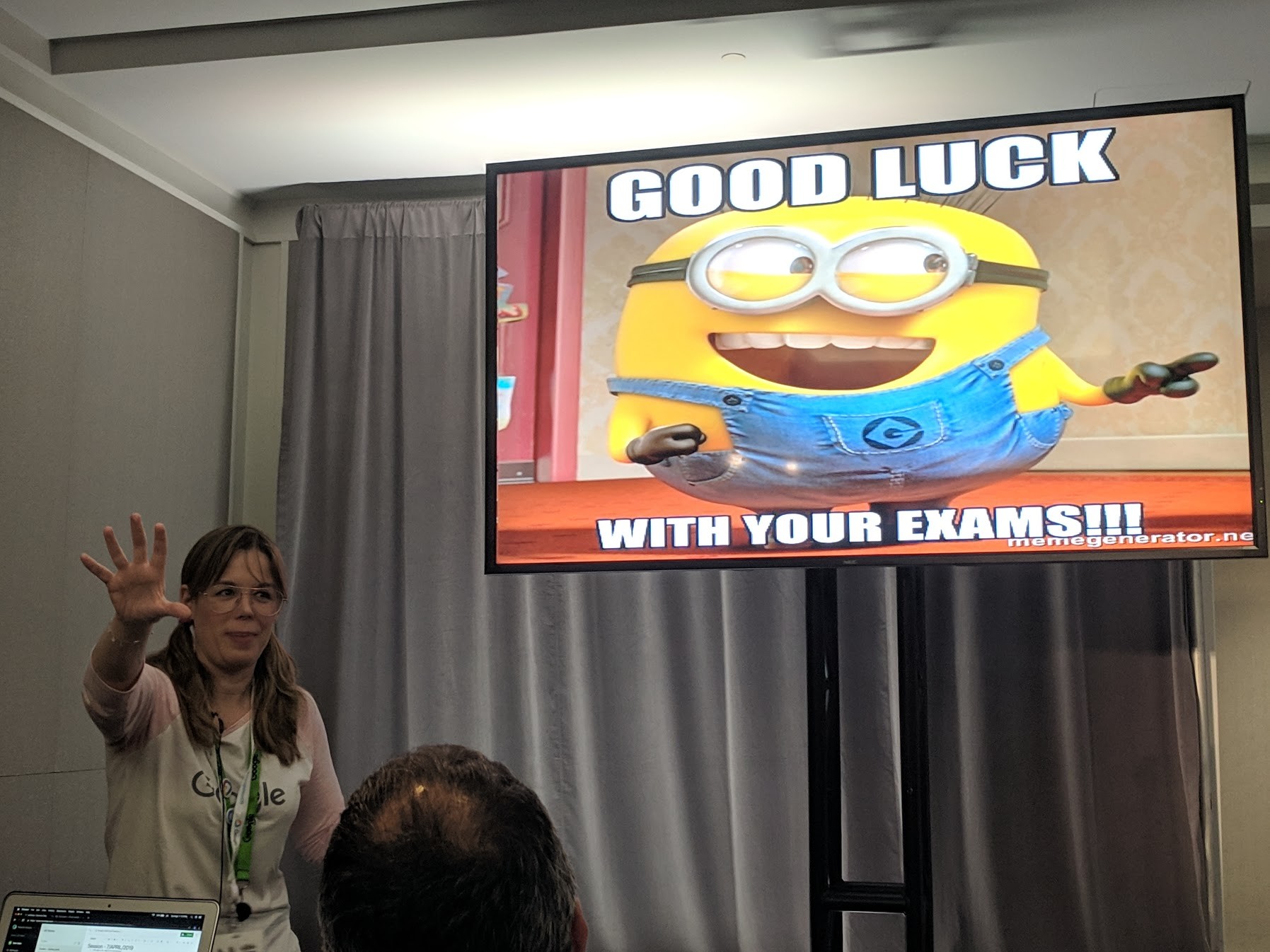
Another way to visualize these blue hexagons is as Minions (those cute snack-shaped yellow creatures) who all do different things while working together as a team - this helpful analogy was used by Concepcion "Conchita" Diaz, an amazing trainer who led my GCP Data Engineer bootcamp 10 days ago.
Assuming the last paragraphs did not cause you to close the tab, let's get back to Google Cloud Next.

(don't try click on this 360 pic, LinkedIn does not support it, so I just made it a screenshot - click here for the original 360 image).
This mega-event consisted of dozens of simultaneous workshops, including a mix of launch announcements, satisfied customer testimonials, Q & A and everything in between. There were also hundreds of booths, some of which belonged to Google. These would showcase real-life examples of how GCP technologies make a positive impact, be it at a governmental, business, educational or community level. This happened mostly at Moscone Center. On the 3rd floor there was a "Leader's Circle", Lord knows what happened up there, but large goons with earpieces cordoned off the entrance from simple folk like myself...one day...
The second floor was room after room of presentations, which you had to sign up for or miss out on. Choosing was hard, since there were many interesting sessions happening at the same time. This is where it pays to have a team of 40 people who can be at the event and regroup to share what they all saw. Unfortunately this is not Cloud Lion's case... one day...
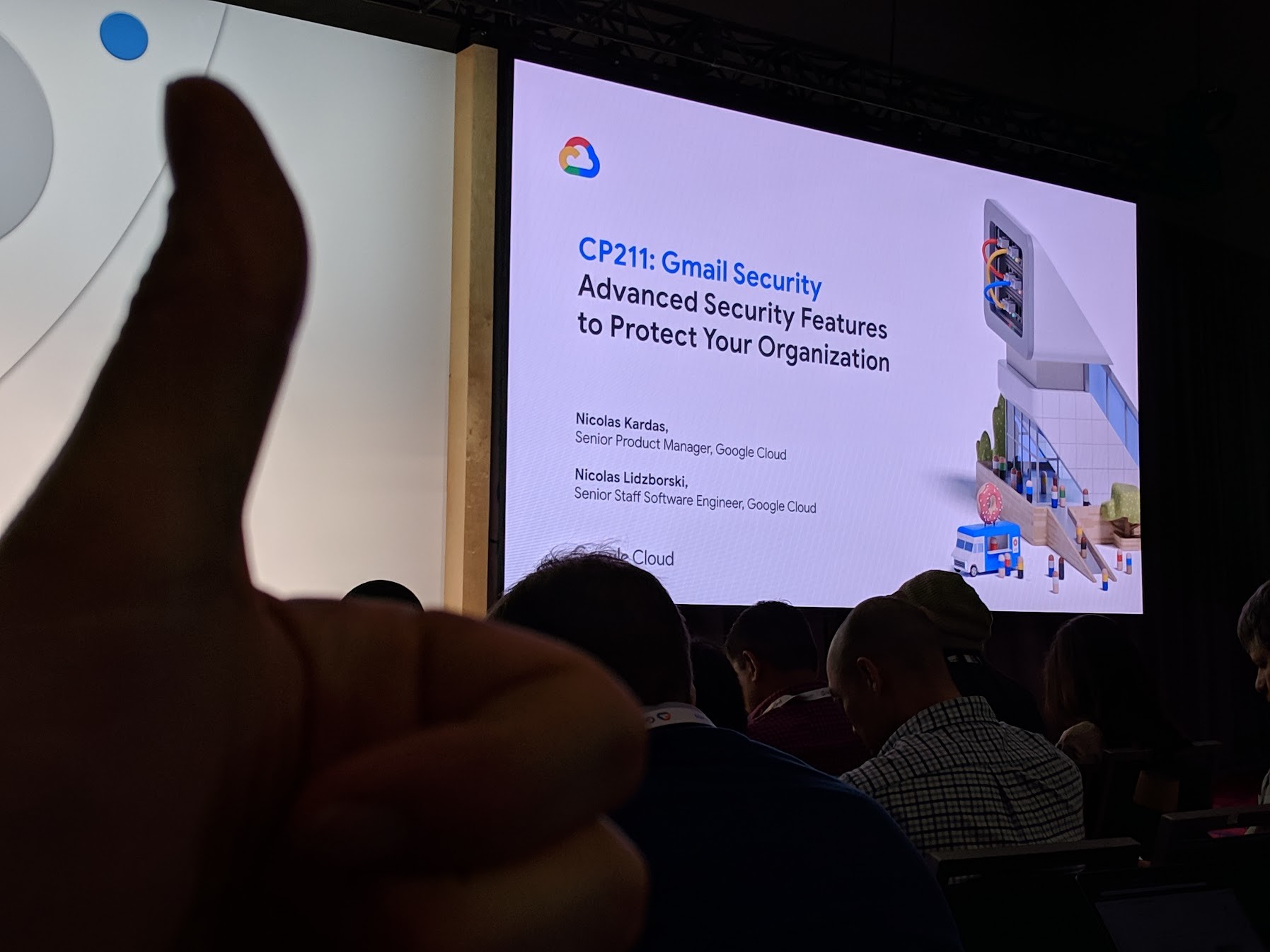
A session I found particularly interesting was Advanced Security Features for Gmail, another was about how Fossil Group (leaders in smart watches, who make the Fossil Sport, which boasts the 3100 SnapDragon chip and runs on Google's Wear OS - which I may have to purchase in the near future) fully adopted G Suite in 100 days. Anyway, there were hundreds of sessions, and I could not see all of them. 90% of sessions were GCP related, again highlighting the priority for Google and for the event as such.
Many announcements were made - 122 to be exact. The top three for me were: Connected Sheets (Google Sheets directly integrated with GCP!!!), Drive Metadata, and live captions in Hangouts Meet (!!!). Oh yes - and one more - Gmail "confidential mode" - which will change the way we understand email.
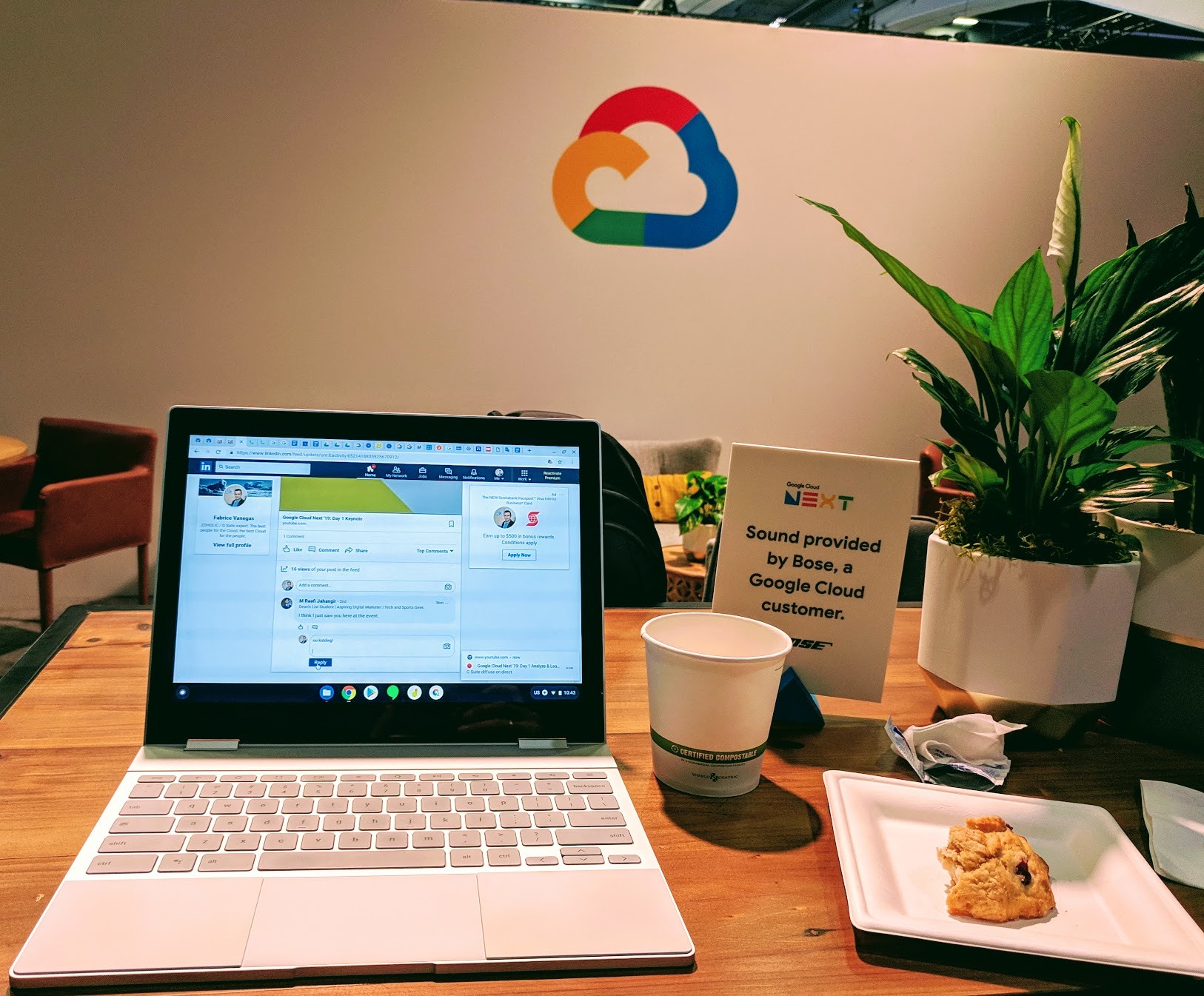
The madness continued for 3 days, there were places to step aside and get some work done, like the Biz Tech Lounge, which gave Bose Quiet Comfort 2 noise-canceling headphones to disconnect from the noise while answering emails or whatnot. Bose is a customer of Google, and they did not waste the opportunity to remind us of it.
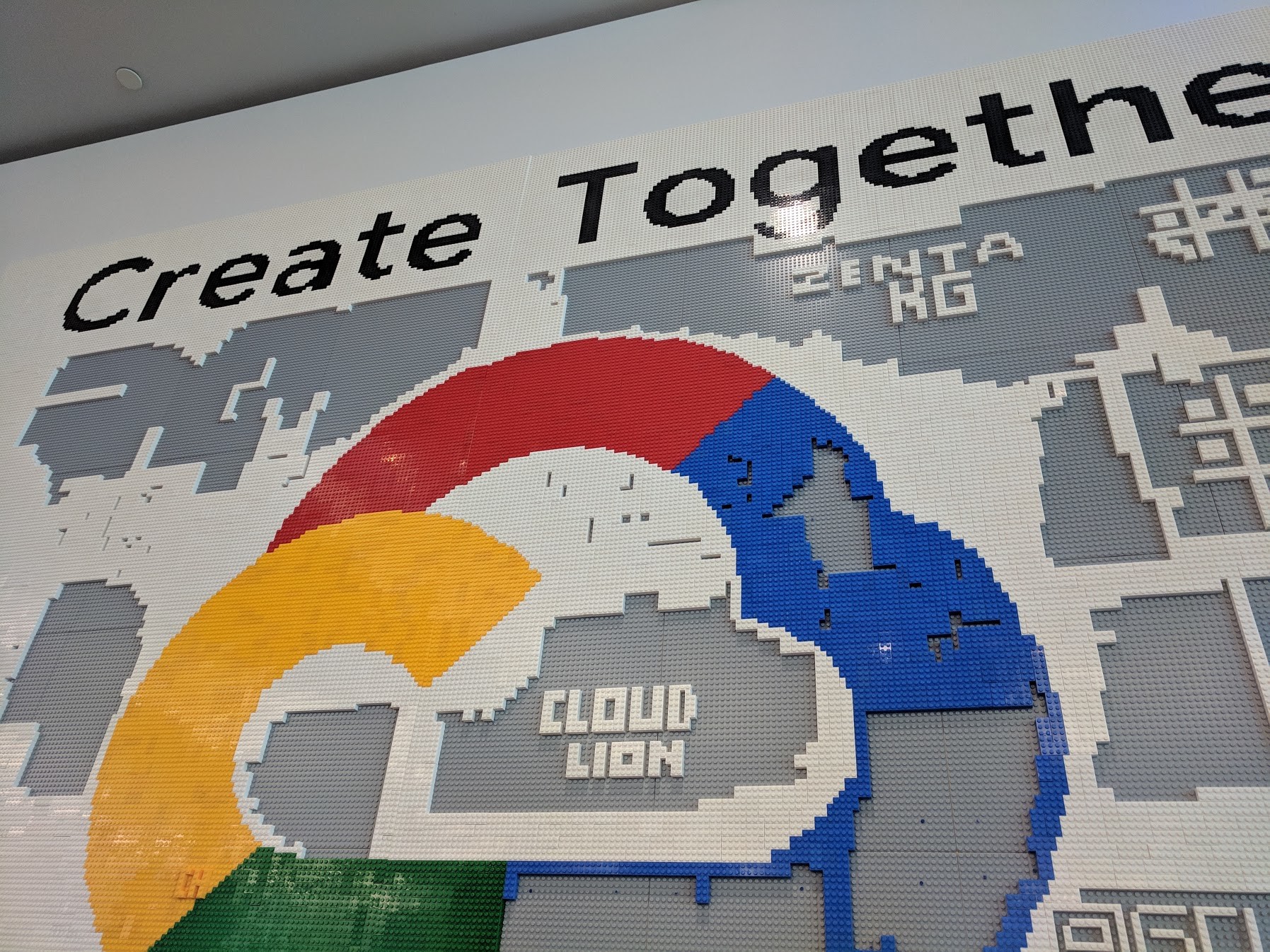
The event spilled out into other venues, such as the nearby Intercontinental Hotel - which hosted the Google Partner Lounge as well as 4 floors of training rooms for bootcamps and certifications. One-on-one meetings were also possible, where we can speak to Google engineers regarding technical questions - a priceless opportunity to geek out asking non-Googleable questions to tech ninjas.

There were many experiences available for developers and data scientists to play with GCP's raw power in hackathons and the like. One of my favorites had to be "Instruqt" arcade machines to practice GCP skills on - cool concept.
Finally, there was the Certification Lounge, where those of us who have put in the extra work to become Google Certified were able to enjoy a picture, an amazing blue jacket and even a medal, yes, a medal!
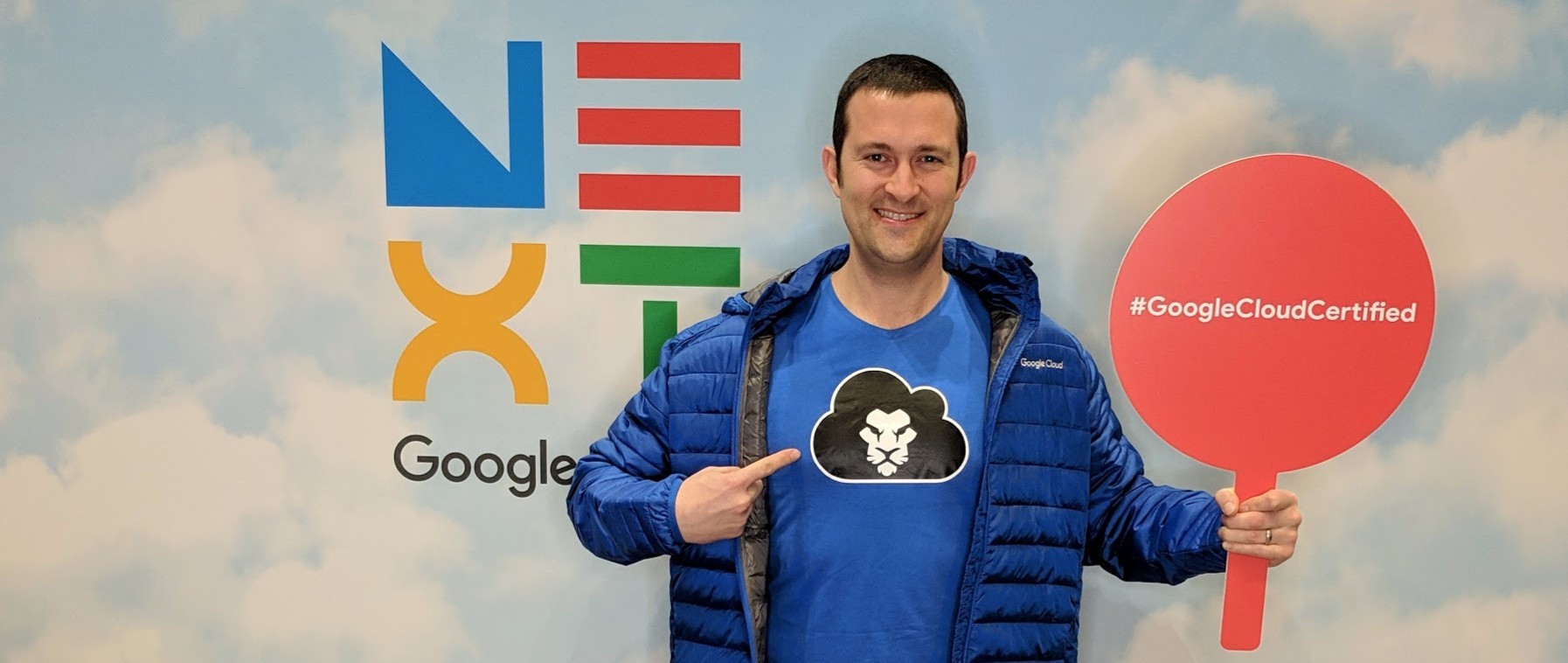
Anyway, the event was superlative in many ways, it took over the Yerba Buena Gardens, and there was a big party at Oracle Park, where Gwen Stefani played No Doubt's hits, there were large screens, loud speakers and free ice-cream. Nice walk down memory lane for a guy pushing 40 like myself.
The scale of partner reception on Monday night showed the growth in the partner ecosystem, there had to be close to 1000 people there, many more than the first Google Partner event I attended in New York's Google campus in 2016, where they struggled getting 100 seats filled.
Google is an engineering company, not a sales and marketing company. Google's sales strategy relies largely on partners as their "boots on the ground". This is not to say that Google does not have an army of the most talented account executives / sales engineers in the world, who are laser-focused and under unimaginable pressure to produce results - but these guys focus on Google-sized deals with major corporations.
The folks at Google rely on partners like Cloud Lion, but clearly do not depend on us. Partners allow SMB's to have direct contact with a human being who will take the time to properly train them, and ensure that the adoption of this amazing technology is a healthy one. It requires a high-touch approach to manage change properly, this can be the difference between a successful implementation and an expensive flop.
This is 2019. It is no longer a question of if your business will go to the cloud or not. It is a question, of when you will go to the cloud, and how you will do so.
If you have the internal resources to successfully deploy, migrate, train and manage the change resulting form "going Google" within your organization, then - what are you waiting for?
If you do not, find a partner - but choose wisely.
A good partner is one that takes the time and effort to keep up to date with rapidly-developing technology, they do this by attending major international events such as Google Cloud Next, and undergoing rigorous continuous training. A good partner is one that carefully cultivates contacts with major players such as Google, and who can mobilize the necessary resources to take care of whatever your business needs are. A good partner thinks globally and acts locally, being able to speak multiple languages to engage different stakeholders across this increasingly globalized world. A good partner invests in the latest and greatest technology (such as Google's Jamboard), and is prepared to make it available to you.
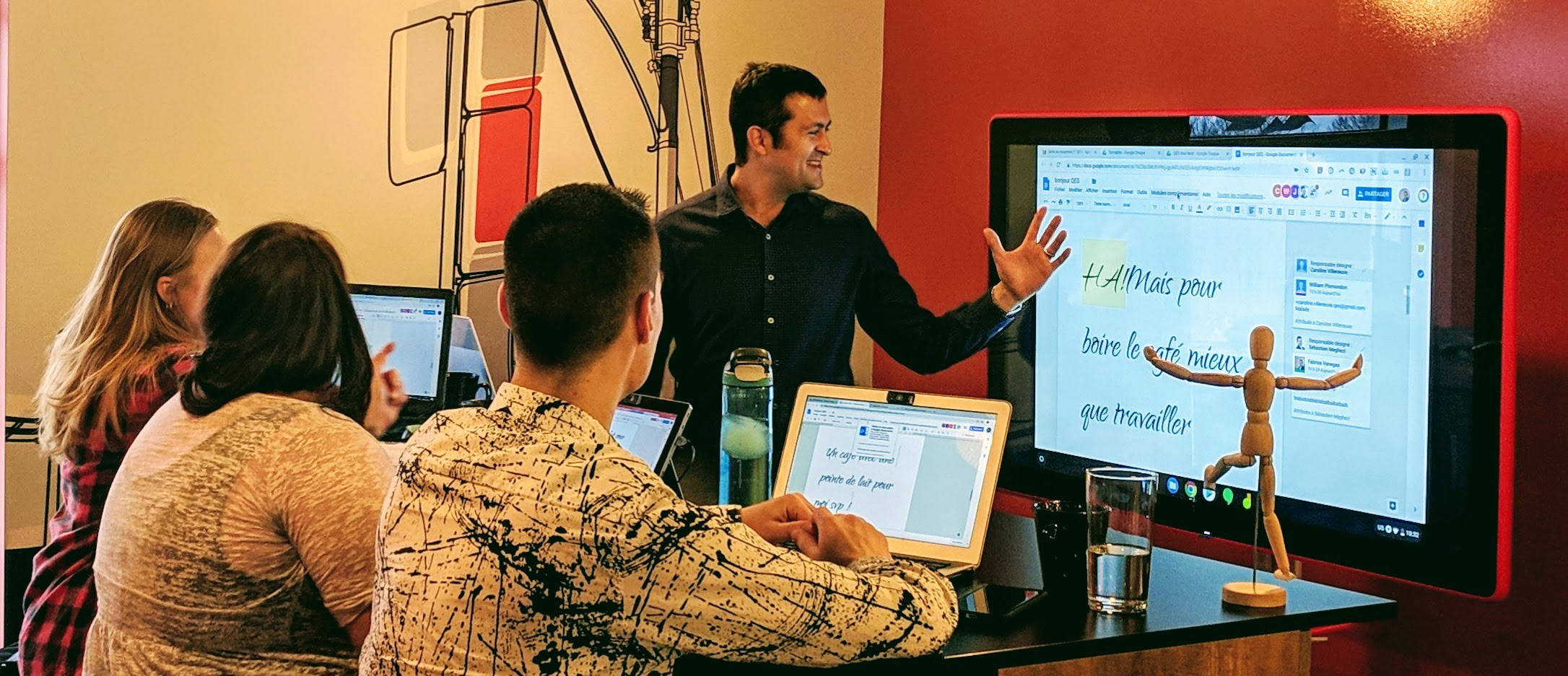
A good partner will always think in your best interest, and never try to sell you something you do not need. A good partner is before anything human, someone whom you should be able to "click" with. Our character and our values make us who we are as human beings, and this distills into our company - which is an extension of what is most dear to us.
Choosing the wrong partner can be incredibly expensive, time consuming, and sapping. So by all means, choose wisely! A good partner will make it a partnership. A lousy partner will make it a partner$#!t...
The finest technology in the world is absolutely useless if the human factor behind its adoption is not adequately cared for. Deploying the world's most advanced systems in a business that is not ready for it would result in something like receiving an Alfa Romeo, but not driving it because you can't drive stick... a waste. Having a partner where the founders are educators and academics will result in the best knowledge transfer/learning - which paves the way towards a healthy adoption.
SO, WHAT'S NEXT?
It is spring, (or at least it's supposed to be - Quebec weather can be cruel). This is the time of the year for rebirth, growth, re-invention, and where life's energy supercharges us into making the impossible possible.
This is the season to transform your business with the world's most powerful technology - but make sure you are well accompanied.
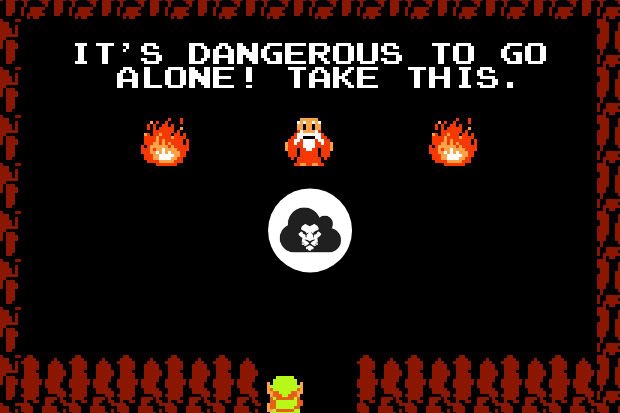
Perhaps I'll see you at the next Google Cloud Next, from April 6th - 8th 2020. If you go, you got a wing-man. If you don't, you got someone there who will come back to share it all with you. Happy Easter!
